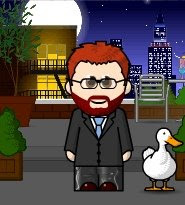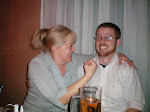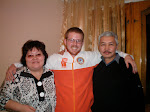As I’ve reached the 9-months milestone in my Peace Corps service, I’ve noticed that life is quite different than when I first arrived to Almaty, and different still from my first few months at site. Early on, every day was an adventure; I would wake up looking forward to the surprises and unique experiences I would face through my every day work, life and interactions with the local community. With the days lengthening and the icy memories of winter melting away, I now see that the events and surprises in my life have become both more subtle… and more drastic.
Through April and May, I had fallen into a comfortable routine of English at school, English club and Spanish class at the library, weeknights at home, weekends with PCVs. Summer was on the horizon, moods were high, everything flowed freely without much resistance. I no longer am surprised or occupied with the stares I get on the street and in the stores. I don’t laugh out loud anymore when I see police officers in their gigantic hats. I’ve greatly reduced the frequency with which I utter the words, “I don’t understand why people do that here. It just doesn’t MAKE SENSE.” I consider myself fairly culturally acclimated. With a decrease in every day revelations and amusing cultural faux pas – M&Mshere are “em-en-dems” and they say Seven Up, not “syem verh” – comes a general decrease in the novelty of living in a foreign culture. Lately, I’ve been pleasantly surprised by some more subtle aspects of life here.
Firstly, I’ve noticed how my host mom has adapted her speech to fit my Russian ability. At first I attributed my heightened understanding of conversations with her to my amazing progress in learning the language, but I’ve noticed how carefully she picks her words when conversing with me. She now knows pretty accurately what I know and what I don’t, and tries to use only the words she knows I’m familiar with. If a new word does slip in, she catches my unconscious facial expression signaling my confusion (which I thought I was pretty good at hiding) and immediately drops two or three synonyms or a brief explanation complete with hand motions or drawings. She’s amazing. Also, I’ve started seeing more and more people I know on my daily walks around our small city. Most smile and wave, some say hi, either in English or Russian, a few even stop and chat for a minute before going on with their own business. I’ve been pleased with my level of comfort living at site, and being able to refer to Petropavlovsk as home.
But as I said, not all the surprises these days are subtle. On Sunday, June 1, 2008 at 10:25a.m. I broke my collar bone. The weather was perfect – the sun was out, along with a cool breeze. I had finished administering my 10th graders’ English final exam the day before. I went with Sarah to play some soccer with the local crew I’ve been playing with a few times a week. Mostly ranging from 28-38 years old, these guys play three times a week, and Sunday is always the biggest turnout. We divided teams and got down to ballin’. About fifteen minutes into play I was running for a ball coming in from the sideline and was blindsided by a big Russian guy named Sergei. I caught his right shoulder on the back of my left shoulder and heard a pop. Now, I had had surgery a year and a half earlier for a separated AC joint in that same shoulder, and when I realized I couldn’t lift my left arm, I thought that that $3000 surgery had just been undone. I didn’t fall down from the impact, meaning he really didn’t hit me that hard, but it was obvious that something wasn’t quite right. I sat down on the bench and about 10 minutes later we decided to call an ambulance. A local guy named Farhat, the one who had invited me to play in the first place (really great guy), took care of logistics while Sarah ran to my house to pick up my identification documents.
The ambulance, an old green rounded van at least twenty years old, arrived with a doctor and two young (very young) assistants. I crawled into the back and explained that my shoulder hurt a lot and that I wasn’t allergic to any medications. They gave me a painkiller shot in my right buttock, but unfortunately it wasn’t strong enough to prevent me from noticing the lack of shocks on the van as we barreled our way through the uneven and cracking streets of Petro. I looked around the inside of the ambulance at the dust covering most surfaces, the toolboxes of medications, the stretcher on wooden blocks that could serve as a bed, and thought about how glad I was that I wasn’t bleeding or in some more serious predicament.
At the hospital I was ushered to the front of the x-ray line, the resulting negative image showing a nasty-looking break in the middle third of my left clavicle. The two “clavicular fragments” were at about a 140 degree angle, with the proximal end (the one attached to my neck) about a centimeter higher than the distal end. Quite obviously it wasn’t my joint. After talking with the local doctors as well as PC’s Dr. Victor in Almaty, we decided to apply an upper body cast holding my left shoulder and arm in place and fly me to Almaty.
After a nightmarish 6 hour layover in Astana due to technical difficulties, I arrived in Almaty, where PC put me up in a “sanatorium” or resort and spa hotel. It wasn’t nearly as nice as any spa and resort in the states, but it was comfortable and my meals were provided. However, in those first 78 hours between the injury and taking off the cast, were not pleasant. They wouldn’t give me anything stronger than Advil, and many simple tasks became pretty tedious. Things that are difficult one-handed: putting on socks, tying shoes, taking money out of wallet, accessing left pocket, typing, untying plastic bags, washing clothes.
I went to a local orthopedic traumatologist who took another x-ray and recommended that we have surgery. PC’s policy states that any non-life-threatening medical condition should be reviewed through the Office of Medical Services (OMS) in DC. So, we sent the x-rays and the local specialist’s evaluation to DC and waited a night, while I contemplated how much my summer would change if they did surgery. They would probably fly me to Thailand or DC for the surgery and then I would need to spend my 4-6 weeks of rehab there before being cleared to come back to site. With my parents planning to come in 3.5 weeks, that option didn’t look to good.
Word back from DC was that no surgery was needed, as a relatively new method of treating middle-third clavicle fractures without nerve or tissue complications has proven more effective without the aid of a scalpel. In the former USSR, 80% of middle-third fracture cases are treated with a surgery to realign the bones and bolt them together. In America, 80% are treated with a soft MEEK figure-8 brace which pulls the patients shoulders back, thereby separating the clavicular fragments so they can realign and refuse together. No surgery. In my communications back and forth with my family I received much support and optimistic comments, my favorite being: “I can just see the headlines now: AMERICANS AND RUSSIANS SETTLE CENTURIES OF DIFFERENCES DUE TO PCV CLAVICLE FRACTURE.”
The finale of my misadventures in the world of Kazakhstani medicine came on Wednesday when they found a brace to try. It consists of two padded straps like backpack straps that are connected in the back by metal buckles, and resembles a detective’s gun holster. The local doctor who was helping Dr. Victor put it on me decided that we could numb the area (OK by me) and try to manually align the bones before applying the brace, which he thought was designed to keep it in place. The shoulder was numbed, the patient’s arms were pinned back by Large Soviet Doctor #1 as Large Soviet Doctor #2 wrestled with two bones that acted like identical magnetic poles, getting close to touching and then popping back away from each other. The brace was applied and tightened, unfortunately to the point of breaking a buckle. The wrestling match went three rounds and lasted about ten minutes. I’m not quite sure who the winner was, but I’m pretty sure it wasn’t any of the three sweating men in the room, as the bone was not set, the brace was jimmy-rigged into a knot, and the local anesthetic was wearing off. I went back to the hotel and slept for three hours that afternoon.
Two days later a new brace arrived from the US Air Force base in Bishkek, Kyrgyzstan, which was exchanged for the damaged (and now a little stinky) first brace. The brace was applied without excess force, as new information revealed that the brace is supposed to simply relieve the pressure while the bones gradually (I’ll wear it for the next 4-6 weeks) align and heal. Due to a few nights out with other volunteers, locals, and a birthday party in Avat, my painful southern excursion ended up being a bearable experience.
I’m now back at site, preparing for the coming camps and my parents’ trip, glad that this drastic surprise hasn’t ruined really any of my summer plans. And with all the support and care I’ve received from friends and family, I’ve been reassured that life will continue on as usual, with a few minor adjustments, for my remaining 18 months.
Subscribe to:
Post Comments (Atom)
.jpg)








3 comments:
Hey, Felipe,
Welcome back!
Glad you've already been able to party a bit, but the summer soccer-league seems to be off the schedule. That's the pits, but at least you can slow-dance!
(I'm a one-handed typist myself. If you have a choice, the left hand is best, since the QWERTY keyboard is designed to slow down the right hand so typewriter keys won't be jammed as easily by a fast typist. You had no choice? Sergei didn't ask?)
So glad you are back to where you need to be and that things turned out well...or as well as can be expected. You have been in my thoughts and prayers. You will be happy to know the house I bought in Louisville doesn't need insulation UNDER it and doesn't have an attic that needs emptying! Enjoy your visit with your mom and dad.
Be happy, be safe and have fun.
Karen Burnett
Felipe,
Each post is so well-composed! It's a pleasure to read your blog.
Nowadays, careers are made by blogging; it could be an avocation for you, with something more social as a day-job.
I hope your recovery proceeds apace: slowly, to be sure, but steadily.
Post a Comment